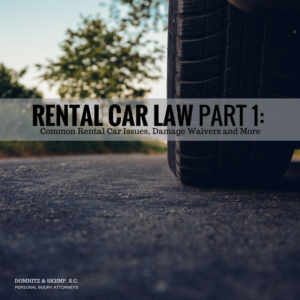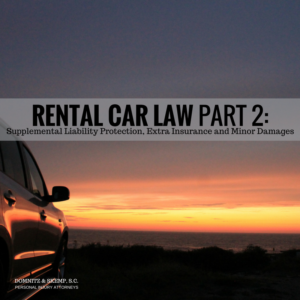Part 1: Common Issues, Police, Credit Card Coverage
Until you get into an accident or are pulled over, renting a car may seem fairly easy. Skimming the fine print is not a good idea when it comes to car rentals, though. To protect yourself, legally, you’ll need to know what you’re agreeing to, even—and especially—when the contract language is confusing. By having a cursory understanding of how this process works before you enter into it, you could save yourself both time and money. This two-part blog series will help you know what to look out for next time you’re thinking of renting a car.

Common Rental Car Issues
It’s important to know what kinds of issues you may run into when driving a rental car and, in worst-case scenarios, what you may be liable for and what you may be covered for. To best protect yourself, we will answer questions concerning these common car-rental topics:
- Police stops and profiling
- Damage waiver loopholes
- Car insurance coverage
- Credit card assistance
- Optional supplemental liability protection
- Extra personal protection
- Minor damages
What Happens When I am Pulled Over by Police?
If the car you’re renting seems unfit to be on the road in the eyes of the law, you’ll be left to deal with the consequences. Car rental companies may tell you that expired license plate stickers, for example, are no big deal, but it’ll be your time and effort spent on explaining this to a police officer. While it’s true that officers can run the plates and learn that, despite old stickers, they are up-to-date, any excuse to pull you over may be capitalized on, depending on the officer. Even if you’re doing nothing illegal, you could be profiled. If you indeed are breaking the law, the officer can use the excuse of expired plates to further investigate.
Should I Purchase a Damage Waiver?
“Damage waivers” are how car rental companies offer to legally protect renters from liability. It’s not so straight forward, though; there’s a lot to know about what damage waivers do and don’t cover.
Passing up on the purchase of a damage waiver means that car-renters are liable for all damages caused to the vehicle, including accidents, reckless driving, or theft due to carelessness. In any of these cases, it becomes the renter’s responsibility to pay for repairs and towing. The renter will also need to pay each day the car is being worked on. In extreme cases, the renter may need to purchase a brand new car for the rental company.
Liabilities will also apply to the renter if an unauthorized driver damages the vehicle. It will be the responsibility of the renter to prove that he or she did not willingly allow an unauthorized driver to operate the vehicle and could not have realistically prevented it from happening.
As long as car-renters follow these guidelines, damage waivers can provide excellent protection. In cases of neglect on the part of the renter, whether because of careless driving, lack of cooperation with police, or drug or alcohol use, damage waivers are null and void, with the financial onus being placed on the renter.
Will My Auto Insurance Policy Cover Rentals?
Car insurance does not look at rental cars and personally-owned cars in exactly the same way. If you’re an insured driver, your policy will likely help with damages to rental cars, but it’s important to understand exactly what is and isn’t covered by the insurance company.
Your car insurance policy will not cover all damages to your rental car. If, for example, the car is stolen or taken to the shop for damages, the rental company may still charge you for the time that the car has been away from their lot, regardless of the reason. Another insurance exception has to do with location: damages to rental cars in other countries are unlikely to be covered by your policy.
What Assistance Will Credit Card Companies Offer?
Some, but not all, credit card companies have policies about protecting card-users from damages to rental cars purchased with that card. Even if primary coverage comes from insurance companies, these credit card benefits may act as a good supplement to dealing with damages. Another positive aspect of using these particular credit cards is that their coverage will often apply even out of country.
Each credit card company has its own specific approach to helping with damages to rental cars. The duration, location, and type of rental are all factors that each company has guidelines about. Contact your credit card company or read the company’s policy to determine if and how you can rely on them for assistance with damages.
Part 2: SLPs, Extra Protection, Damages
There’s more to renting a car than getting the keys and hitting the road. Understanding the legal agreements behind each car rental can save you valuable time and money in the long run. This two-part blog series will give you a cursory education on how to be legally smart when renting a car.
In the first part of this blog series, we covered common rental car issues, including police stops and profiling, damage waivers, car insurance coverage, and credit card assistance. In this second part of the series, we will cover the remaining important topics.
Do I Need Optional Supplemental Liability Protection?
Many car rental companies provide “optional supplemental liability protection,” or SLP. This protection is meant to cover renters who experience accidents, including those that result in injury.
SLP coverage may vary by state. In Wisconsin, the renter must have personal car insurance with liability limits of $25,000 per person and $50,000 per accident. SLP coverage in Wisconsin is also dependent on how damages to a rental car have occurred. In cases of collision, SLP coverage may depend on who is at fault and what kind of insurance each party has.
In many cases, the relationship between SLP coverage and insurance policies is ambiguous. When considering SLP coverage, it is wise to consult professional legal advice to determine the extent of your potential liability and coverage in case damages were to occur.
What About Extra Personal Protection?
Extra insurance is often offered by car rental companies to cover personal damages to drivers, passengers, and belongings. Exclusions frequently apply, but obtaining extra personal protection may contribute supplemental assistance to cover medical costs that are primarily handled by personal car insurance policies.
Am I Covered for Minor Damages?
It can be tricky to defend yourself if car rental companies claim that your rental car was returned with dents, scrapes, or other minor damages. The best legal protection is documenting the vehicle before driving it. With a representative of the rental company present, take notes and photographs of any existing imperfections on the vehicle, including dented bumpers, scratched paint, and other minor damages.
If you do, indeed, cause minor damages to a rental car, you’ll still be assisted by Wisconsin Law in getting estimates for the fixes from companies other than the car renters. The rental company must act quickly—two days, to be specific—to notify you if they believe you’re responsible for minor damages, so that you have a chance to understand the situation without being charged seemingly exorbitant amounts. The rental company is also required to show you how they came up with the price that they seek to charge you.
Choose Domnitz & Domnitz, S.C.
If you or a loved one is dealing with rental-car damages and costs, you should seek out the advice of legal professionals. Contact the Milwaukee car accident lawyers of Domnitz & Domnitz, S.C. for a free consultation, use our online form or call us now at (414) 289-0909.




